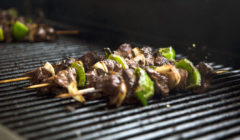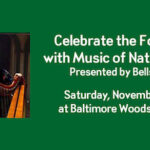Middle Eastern Festival to Unveil Brand New Historically-Rich Flavors
If your palate is particular and you delight in digesting stories about food origins, then come for an exciting expedition in awesome eats with flavorings that span centuries —all to be found at this year’s Middle Eastern Festival at St. Elias Church this July 12-15.
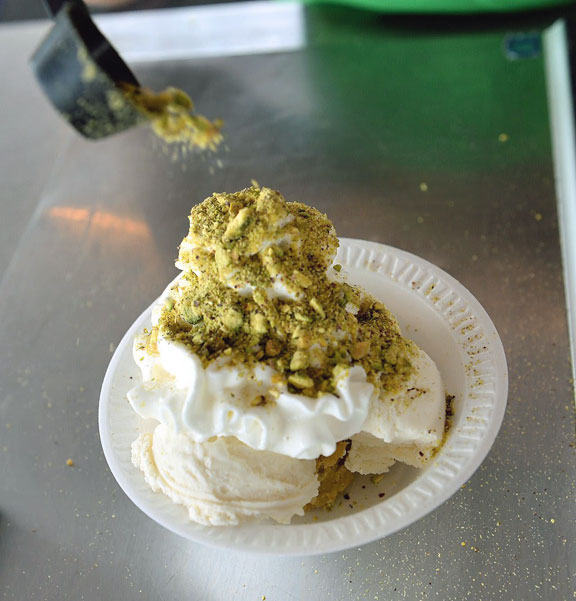
Partnering with Gannon’s Isle, the Middle Eastern Festival proudly brings you Arabic Pistachio Ice Cream to delight the taste buds
Making its groundbreaking debut at the event, dessert devotees will be in seventh heaven when they discover the divine “Arabic Pistachio Ice Cream.” St. Elias Church’s Middle Eastern Festival Chair Ramzi Khairallah has partnered with Gannon’s Isle, Syracuse’s favorite homemade ice cream shop, to co-create “Arabic Pistachio Ice Cream”. Unlike regular pistachio ice cream, this sweet creamy cool sensation boasts of the exclusive enhancements of rose water and orange blossom. While brand new to the American palate, these traditional Arabic flavorings have been relished for centuries —in fact, the very concept of ice cream itself is rooted in the history of the Middle East. The Persian Empire is credited withhaving invented the idea for ice cream then later revolutionizing it. The word “sorbet,” which first appeared in the English language in the 17th century, is derived from the Arabic word “sharbat” which means
fragrant mashed fruit drink. Sorbet began as a sweet drink, traditionally prepared with fruit, flower petals and sometimes wine or liquor which, as cooling methods eventually became available, turned into a frozen dessert. This refreshment’s storied history in the Middle East reflects that it was considered a delicacy that was largely limited to and exclusively enjoyed by the Ottoman elite, who came to power in the 14th century and reigned across the entire region until 191
This year’s Festival bar menu raises the bar with more selections, inviting wine enthusiasts to explore Lebanon’s selections of Ksara and Massaya vineyards. Although winemaking is believed to have originated in the Middle East with the Phoenicians during Old Testament times (mentioned multiple times in scripture), the Phoenicians went on to become the masters to supply the Roman Empire. It was after the Ottoman Empire’s rise to power that almost all winemaking was outlawed. But the industry made a comeback in 1857 when Jesuit monks in the Bekaa Valley were given permission to make wine for Christian religious ceremonies —Ksara winery was born. Bekaa’s unique wine taste is in part due to 300 days of sunshine. In 1898, underground tunnels beneath the vineyard were discovered, dating back to the Roman period and now used for storage. In 1973, the monks sold Ksara to local businessmen. As the oldest and most popular winery in Lebanon, Ksara debuted in Syracuse at St. Elias’ 2016 Middle Eastern Festival and will again be served this year. Also available will be one of Lebanon’s newest wineries, Massaya, which offers a modern French-style high-altitude method of growing native grapes with a distinct fruit taste.
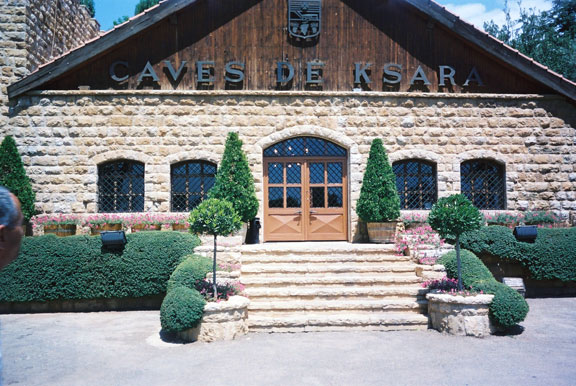
This year’s Festival bar menu raises the bar with more selections, inviting wine enthusiasts to explore Lebanon’s selections of Ksara and Massaya vineyards.
Cravers of craft beer will be all about Almaza, Lebanon’s #1 beer and one of Lebanon’s oldest breweries with its founding dating back to 1933.
Other taste attractions include the addictive game-changing garlic spread/dip guaranteed to give gusto to any anything it comes into contact with. As a spread, this healthy condiment is used in sandwiches. As a dip it is served as an accompaniment with fries, chicken or other meat dishes. Either way, its character of a special signature taste is one that Syracusans can only experience at the Middle Eastern Festival. Other highlights include carefully selected ingredients such as the best quality beef tenderloin (filet) for shish kebab and certified angus sirloin steak for the shawarma.
The Festival features the locally grown tie-in with wild grape leaves harvested from right here in Syracuse, supplying the main component for the Festival’s traditional dish of the lemony stuffed Grape Leaves.
The Festival also serves a style of the currently popular food fusion with its Arabic sandwiches presented panini-style. Inspired by Italian culture and blending in Arabic ingredients, this special combination is a big hit across today’s Levant.
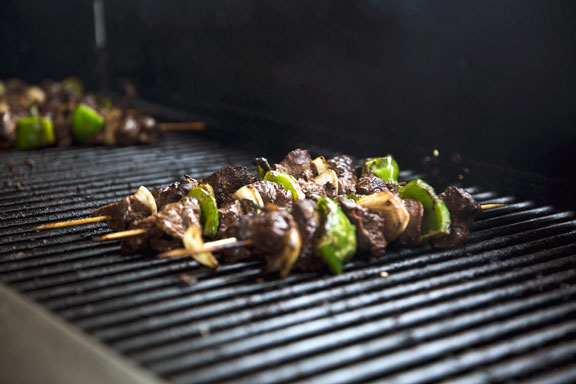
Other highlights include carefully selected ingredients such as the best quality beef tenderloin (filet) for shish kebab and certified angus sirloin steak for the shawarma.
From the trendy to the traditional, the Middle Eastern Festival has all the Arabic food favorites along with live music, dance, and souvenirs from the souk marketplace.
To see the complete menu and get more event information, visit:
www.syracusemideastfest.com
By Debra George

